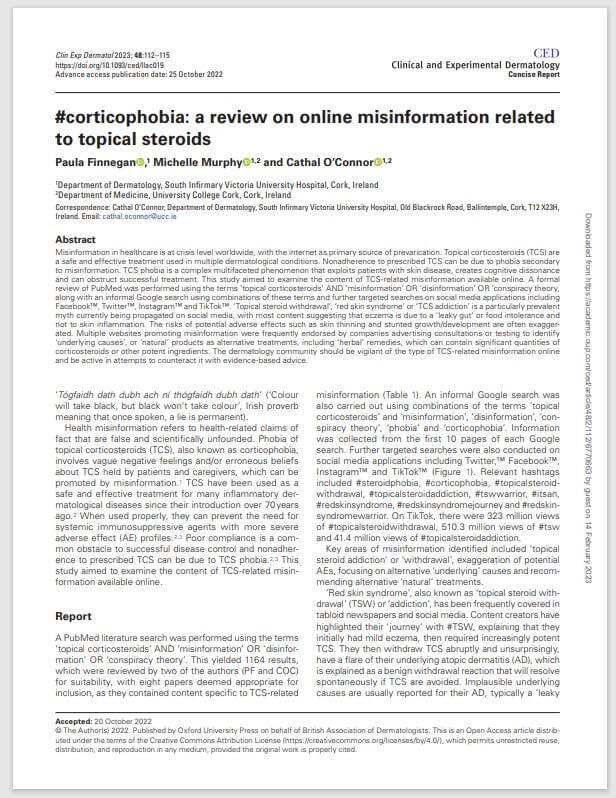Topical steroid phobia, or ‘Corticophobia’ a phrase coined by dermatologists to help them categorise the hysteria of their patients, is possibly one of the most insulting phrases I’ve heard in relation to eczema and topical steroid withdrawal.
This study has appeared in The Educational Journal of The British Association of Dermatologists and was written by:
- Paula Finnegan – a young female dermatologist. Department of Dermatology, Cork, Ireland. You can find her on LinkedIn here.
- Michelle Murphy, Department of Dermatology, Cork, Ireland
- Cathal O’Connor – Department of Dermatology, South Cork, Ireland – Contact him on cathal.oconnor@ucc.ie
I have tried to get in contact and connect with the three authors, so far with little success.

If you are planning to visit any of this trio check out the following blogs to prepare yourself before your visit:
You can read Cortiophobia – a review on online misinformation related to topical steroids, 2022.
Here’s a pdf for you to download it.
Do they mean well with this article?
I’ll start by giving them the benefit of the doubt, that this article comes from a good place. I do believe there are a lot of companies preying on people with atopic dermatitis and chronic eczema, offering cures. When in fact there isn’t a cure, it’s a matter of finding out what affects your skin and helps you reduce inflammation. This is incredibly complex for people because and we are all different. What helps one person might not help another.
The key failings in this study into topical steroid phobia
The main problem with this whole study is its bias to only look at papers written about misinformation and steroid phobia. Yet there have been plenty of studies done that are attempting to understand TSW better. Such as the TSW -Time to bridge the gap article recently published by the British Association for Dermatology.
Some people might not be managing their skin well
There may be people who aren’t managing their skin well, and in turn struggling with terrible skin because they don’t know what to do or don’t follow good guidance. But for every one of them, there are people who do everything by the book, follow guidelines, use the steroids and still end up in a spiral of declining skin and rebound flares.
Most people experiencing TSW followed guidelines
It’s clear that not everyone who uses topical steroids becomes addicted and experiences the problems with declining skin, less healing and rebound flares associated with TSW. Some people can use them effectively and get better. What this article ignores is that the vast majority of those suffering with topical steroid withdrawal have followed guidance and used the creams as advised. A medication that comes with a warning to only use for 1-2 weeks (an update to the original guidance), yet dermatologists tell us it’s OK to keep using, on any part of our body. Even when we express concerns, we’re told to keep using a medication that isn’t working. There is a huge amount of accountability on the dermatologist here to listen to patients and just consider for minute whether this ‘safe’ steroid treatment is in fact doing untold damage.
Let’s unpick this article statement by statement
Firstly, here’s the abstract:
Misinformation in healthcare is at crisis level worldwide, with the internet as primary source of prevarication. Topical corticosteroids (TCS) are a safe and effective treatment used in multiple dermatological conditions. Nonadherence to prescribed TCS can be due to phobia secondary to misinformation. TCS phobia is a complex multifaceted phenomenon that exploits patients with skin disease, creates cognitive dissonance and can obstruct successful treatment. This study aimed to examine the content of TCS-related misinformation available online. A formal review of PubMed was performed using the terms ‘topical corticosteroids’ AND ‘misinformation’ OR ‘disinformation’ OR ‘conspiracy theory, along with an informal Google search using combinations of these terms and further targeted searches on social media applications including Facebook™, Twitter™, Instagram™ and TikTok™. ‘Topical steroid withdrawal’, ‘red skin syndrome’ or ‘TCS addiction’ is a particularly prevalent myth currently being propagated on social media, with most content suggesting that eczema is due to a ‘leaky gut’ or food intolerance and not to skin inflammation. The risks of potential adverse effects such as skin thinning and stunted growth/development are often exaggerated. Multiple websites promoting misinformation were frequently endorsed by companies advertising consultations or testing to identify ‘underlying causes’, or ‘natural’ products as alternative treatments, including ‘herbal’ remedies, which can contain significant quantities of corticosteroids or other potent ingredients. The dermatology community should be vigilant of the type of TCS-related misinformation online and be active in attempts to counteract it with evidence-based advice.
I’m going to unpick this article for you, and you can decide whether to enrage yourself by actually reading it.
- Misinformation in healthcare is at crisis level worldwide – quite a sweeping statement and I’m not sure really how this adds anything. There is also a lot of very good information out there and articles like this do more harm by focusing on the bad instead of helping find the good stuff.
- The internet as primary source of prevarication – Whilst this can often be true, it’s been the place where I’ve found so much knowledge, community and support. For those of you wondering, prevarication in the Cambridge dictionary means: the fact of avoiding telling the truth or saying exactly what you think. Far from prevaricating, we are telling our truth, and some of us are screaming it because no one is listening. When every visit to your so called specialist is met with gas lighting it’s no wonder people do resort to Dr Google. To make this statement you dismiss all the good content about TSW from ITSAN, Scratch That, BAD and the Eczema Society and the meagre studies that have been done.
- Topical corticosteroids (TCS) are a safe and effective treatment – I hope this is true for most people but continuing to say this when discussing TSW only serves to dismiss, gaslight and belittle the people who truly are experiencing worsening rebounds due to addiction and damage done by topical steroids. It is a recognised condition by the MHRA, BAD and Eczema society, this narrative doesn’t help diagnose the condition if and when it does occur.
- Nonadherence to prescribed TCS can be due to phobia secondary to misinformation – In my experience this is never the case. No one sets out to make themselves ill for no reason. The words used here like ‘non adherence’ implies this treatment is mandatory. It is not. It is one of many options available for people with eczema and atopic dermatitis. We should not be left with worsening chronic skin if we decide not to use a treatment. We should be left with just the underlying condition. What really happens with TSA is that we realise the cream is not working, specialists tell us to use more, it still doesn’t work, so we begin to doubt it’s the right thing. We stop using it in a vain hope of finding something that does work. PEOPLE WHO STOP USING TS TO DOTHIS BECAUSE THE CREAM IS NOT WORKING. There is no phobia here, just a drive and belief that there must be something that does work.
- TCS phobia is a complex multifaceted phenomenon that exploits patients with skin disease, creates cognitive dissonance and can obstruct successful treatment – Once again, people don’t stop using a successful treatment. I’d still be using topical steroids now if they were working. After all I used them successful for many years without noticing that the rebounds were getting worse. I was told this was just worsening adult eczema and for years I believed them. Far from being a phobia, it’s a very real fear that what we’re using is damaging our skin beyond anything you could imagine. That’s not a phobia. I have a phobia of spiders – when in fact they are completely harmless. Topical steroids come with many side effects and warnings – they are very serious medications so to compare our fear to phobia is belittling and baffling. As a patient I cannot understand why any specialist treating me wouldn’t take my concerns seriously.
- ‘Topical steroid withdrawal’, ‘red skin syndrome’ or ‘TCS addiction’ is a particularly prevalent myth – I won’t even give this comment the time of day. I shall just refer you to my previous blog sharing that the MHRA recognises TSW as real, and remind you all that both the British Association for Dermatology and the National Eczema Society both have statements explaining their stance on TSW that have been shared since 2022. TSW is not a myth it is a tragic and avoidable truth.
- With most content suggesting that eczema is due to a ‘leaky gut’ or food intolerance and not to skin inflammation – This actually makes me believe their research has been sketchy at best because I cannot think of any content that talks about these things as the main causes. They can be implications but at no point is anyone saying it’s not due to skin inflammation. Eczema is caused by inflammation in the body, we all know that. It can still be exacerbated by a leaky gut, or food intolerance and many many many other things besides. It’s not caused by one thing alone. If you are a dermatologist you ought to be ashamed if you are not aware that there are other ways to reduce inflammation in the skin that don’t involve topical steroids. This statement is just incorrect. Content varies, but it’s not just about leaky gut and food intolerance. For information, there are quite a few foods that cause inflammation in my skin – something I discovered myself through trial and error and keeping a food diary.
- The risks of potential adverse effects such as skin thinning and stunted growth/development are often exaggerated – These are adverse reactions noted on the contraindications for the drugs. Though stunting isn’t one I’m over familiar with. The risks are far far worse than this. If they just thinned the skin it wouldn’t be so bad. The effects of Topical Steroids on the skin function are devastating for some of us. If a medication thins your skin, I’d say that’s a pretty serious consideration. It always worried me because I could see for myself how thin the skin was behind my knees for instance. What does this even mean? Who is exagerating?
- Multiple websites promoting misinformation were frequently endorsed by companies advertising consultations or testing to identify ‘underlying causes’, or ‘natural’ products as alternative treatments – How many? What are they referring to here? I’m sure there are some dodgy tests out there, but very few of us getting those done. We are however going for natural options. Why is that such a harmful alternative? It’s as if dermatologists are threatened by us choosing to control our treatment. We should get to choose how we treat our skin. However I’ve not had any consultations with anyone claiming to heal me. I know there are some disreputable organisations out there but you will always get these kinds of companies operating. This has nothing to do with our so called phobia. Once again, there are many ways to heal.
- Including ‘herbal’ remedies, which can contain significant quantities of corticosteroids or other potent ingredients – Yes they CAN but more often they do not. Anyone going through topical steroid withdrawal will be checking and not using anything like this. Some poor souls are actually going through TSW due to disreputable herbal or natural creams that turned out to contain high levels of corticosteroids. This isn’t relevant to the narrative of this article.
- The dermatology community should be vigilant of the type of TCS-related misinformation online and be active in attempts to counteract it with evidence-based advice – The lady doth protest too much! To Paula, Michelle and Cathal – what if you’re wrong? Have any of you read the Baroness Cumberlege report – First do no harm? I suggest you read it. Whilst it’s not about TSW, the parallels, of patients being dismissed, gaslit and ignored are startling. The result is hundreds, thousands, tens of thousands left in immeasurable pain. Do you want this on your hands? Dismissing people and labelling them phobic is a cop out. Do your research and get the facts straight and spend your time helping us, not dismissing and belittling us all over again. Have you really spent hours of your time and probably a lot of money trying to disprove TSW? Once again, baffling.
- Phobia of topical corticosteroids (TCS), also known as corticophobia, involves vague negative feelings and/or erroneous beliefs about TCS held by patients and caregivers, which can be promoted by misinformation – That’s one opinion. My views aren’t based on vague negative feelings, they’re based on hard, brutal, terrible facts and months spent bed bound. I spent years trying to work out why my skin was getting so bad, spreading and changing in symptoms. I suspected allergies, vitamin deficiencies, but nothing seemed to make sense, till someone told me about TSA and TSW. Steroids are a prescribed topical medication – this in itself proves that it needs correct guidance for use. Call this what it is, it’s a real fear, not a phobia.
- TCS have been used as a safe and effective treatment for many inflammatory dermatological diseases since their introduction over 70 years ago – They have also increased in potency by 600+ % over that time. I would like to suggest that after 70 years we haven’t made much progress in treating this condition. It’s a band aid, sticky plaster treatment. It supressed the immune response, often with great results, but it fails to address the original inflammation. The way we treat eczema HAS to change to prevent further suffering.
- When used properly, they can prevent the need for systemic immunosuppressive agents with more severe adverse effect (AE) profiles – this might be true but what does this mean? Where are the figures to back this up? I used topical steroids as directed, yet still needed to move onto Protopic, a topical immuno suppressant. And then methotrexate – a drug that should not be given for treatment of atopic dermatitis. It made me seriously ill and didn’t help my skin that much.
- Poor compliance is a common obstacle to successful disease control and nonadherence to prescribed TCS can be due to TCS phobia – When you’ve had such conflicting advice from different professionals it’s confusing. Use sparingly, stop using them, keep using them, use them more, use them on your face, they’re completely safe. Whey your skin starts to worsen and stopping use leaves you with worse skin than you started with something is going wrong. It’s easy for dermatologists to just blame our illness on ourselves, thus absolving them from any responsibility. Dermatologist use the term poor compliance to ignore the patients concerns and push blame back onto us for being sick. This has got to stop. Articles like this only serve to encourage lazy derms to ignore their patients concerns.
- An informal Google search was also carried out using combinations of the terms ‘topical corticosteroids’ and ‘misinformation’, ‘disinformation’, ‘conspiracy theory’, ‘phobia’ and ‘corticophobia’ – by only searching for these negative terms the researchers have created a very biased and negative, and in my opinion, damaging and one sided viewpoint. I don’t know anyone who is using these terms when sharing on the internet so I wonder what evidence they did find. Conspiracy theory? What are they even talking about here. TSW happens, it is both the responsibility of the patient and the dermatologist to deal with it when it does. The only conspiracy theory going on here is the baffling refusal by 99% of dermatologists to even discuss this openly. Together we can find answers. This article does nothing to further learning, it just does damage.
Topical steroid withdrawal’, ‘red skin syndrome’ or ‘TCS addiction’ is a particularly prevalent myth
Paula Finnegan, Michelle Murphy & Cathal O’Connor
Department of Dermatology, South Infirmary Victoria University Hospital, Cork, Ireland
None of us are saying that going through TSW will cure you of eczema – what it will mean is that you are no longer stuck using an ineffective medication and can begin to discover what DOES help your skin.
They’re such contradictions. Implying we should all just shut up and use whatever drugs they adivise, because you can’t just stop using them, your skin will be unmanageable. Yet they refuse to admit the creams have damaged our skin. If I could go back to my original eczema and not use topical steroids I would do it in a heartbeat.
I feel that I am now going through very mild TSW on my forehead and arms. The rest of my skin is dry but manageable and is like mild eczema. I live a full, rich and busy life now but it’s taken me four horrible years to get here.
My views on this article
- Unethical use of people’s stories and images – What ever happened to ethics here, and seeking permissions to use a person’s images and story. I know the people whose images were used in this study and I can 100% assure you they did not agree to sharing them. They took screen shots of instagram posts from various sources, including Various posts related to topical steroid misinformation from (top)
- dailymail.co.uk – report respectfully and truthfully about TSW. The young man pictured here i Australian Jordan Hendry who is healing well but still going through this condition. You can find Jordan at @ctrl.skin on instagram and he has his own podcast sharing his journey if you’re interested. How is Jordan sharing his story misinformation? It is Jordan’s truth and he has a right to share it. In fact most newspapers have been really helpful in allowing those going through topical steroid withdrawal to get their story out there.
- itsan.org – ITSAN is the charity who supports those going through TSW, yet it’s clear their research didn’t go so far as to actually read their website. The image they showed is just the charity requesting pictures of TSW skin to use to the help raise awareness. How is that disinformation? or misinformation?
- splotchylife – is a blog whose domain isn’t even live an more
- facebook.com – also a useful place for us to use to get together as a community. It’s not surprising that people turn to social media if the attitude shown by the authors of this article is how people are treated.
- justdupree.com – Lauren is an actress and blogger raising awareness about TSW. She has a powerful voice in the community is much respected.
- amazon.co.uk – well done to their researchers who found a book, written by TSW warrior Clare – a good friend of mind.
- Poor research – This article really does take bad writing to new heights. Or should that be lows. You might expect this kind of biased story telling from tabloid hacks, but from professional dermatologist? Just baffling. They decided to prove TSW wasn’t real and so ignored all the fact based evidence that does exist. Instead focusing on what they term disreputable sources.
- Should never have been approved – How did this study even get through the British Association of Dermatology ethical checks? It is incorrect, insulting and harmful. It does nothing to serve the community and should not be given exposure. I hope it is removed from online platforms and will be asking for this to be done once I’ve spoken to the authors
Reading this infuriated me, it feels like we take a few steps forward with awareness and then get thrown ten steps back. This article will do a lot of harm, if all dermatologists are just being fueled to believe we are making up our skin issues, don’t actually have TSW and are deluded steroid phobics.
Even if it’s rare, and I actually fear it’s what most adult recurring rebound eczema is, it is still real. We are living it, struggling with no support and watching articles like this get written.
Wouldn’t some actually research into the prevalence, and guideance for diagnosis be more helpful?
The negative studies that were used in this article
If you take a look at the studies the authors found on PubMed to help them prove that TSW is misinformation, a myth and a conspiracy, you’ll see some commonalities. One of them actually previously written by them and all of them written by dermatologists who believe that TSW does not exist. It’s all very troubling that any of these studies happened. What does it say about people who want to shut down any questioning, free thinking and choice in patients?
| TCS phobia is a multidimensional phenomenon and its complexity contributes to the challenges associated with developing effective methods of allaying patients’ fears of TCS. Many seemingly viable approaches, such as presenting data, are ineffective at improving adherence; even interventions that improve patients’ knowledge of TCS fail to mitigate their fear. Those who are more susceptible to pseudo-profound information may be at higher risk of experiencing TCS phobia | Hrin et al., 20223 |
| High rates of messages about TCS ‘risk’ from family/friends and the internet may affect patient/parent understanding about TCS safety, and this may contribute to treatment nonadherence | Smith et al., 201711 |
| Key areas of misinformation related to TCS include red skin syndrome; alternative causes such as diet, chemicals, dust and vaccines; alternative ‘cures’ and alternative ‘natural’ therapies. Some of these theories can be dangerous, especially relating to severe dietary restriction or to potentially deadly treatments. Patients with AD and their families are susceptible to misinformation given their desire for effective treatment | O’Connor and Murphy, 202112 |
| The high prevalence of steroid phobia does not differ based on dermatological condition or severity. Educational videos and demonstrations of topical steroid application are the most effective interventions to lower steroid phobia. Reasons for steroid phobia include misinformation, lack of education, fear of AEs, polypharmacy, negative experience with topical steroids and frequent changing of clinics | Contento et al., 20212 |
| Parents of children with AD confirmed significant concerns and demonstrated poor knowledge regarding TCS use. Steroid phobia and confusing steroid packaging compound poor treatment adherence. This study emphasizes the need for solutions to improve misinformation, hesitancy and steroid phobia, including clear labelling of potency on TCS packaging | Wilson et al., 202113 |
| Friends, family and the Internet are key sources of misinformation about TCS. Patients received conflicting advice from dermatologists, general practitioners and pharmacists regarding TCS application and AEs | Johnson Girard et al., 20201 |
| An interprofessional practice gap exists between dermatologists and pharmacists regarding TCS beliefs and counselling strategies. Collaborative education and improved communication between the two groups may be needed to ensure that patients receive a clear message about TCS | Millard and Stratman, 201914 |
| The most prevalent misinformation sources leading to steroid phobia are the internet and TV or other broadcasting media | Lee et al., 201515 |
Topical Steroid Withdrawal as a conspiracy theory
Firstly, who in the right mind would deliberately make themselves so ill they couldn’t work, couldn’t barely function and were in pain for months and years going through withdrawal. Who would make this up? It’s awful, brutal, painful, traumatising and exhausting. So to hear people who should know better saying you are all in cahoots, spreading misinformation or just following on and believing misinformation is incredibly hurtful and insulting.
This a conspiracy going but it’s the one that prevents dermatologists from recognising, understanding, learning about and diagnosing and supporting people going through topical steroid withdrawal.
Who on earth funded this study?
I am cynical and am pretty sure we can all agree, this was funded by a pharmaceutical company. What a complete waste of time and money, seriously. This article can get in the bin.
Thank you to the dermatologists who are listening
I have seen a couple of dermatologists respond to this study and I would like to thank them from the bottom of my heart.
- Dr Morris, an American Dermatologist – he shared his response on TikTok, agreeing with me, that this was one of the worse articles he has ever read about Topical Steroid Withdrawal, because of its blatant bias to prove its own point, rather than add to the debate and learn. It does nothing to help us understand TSW, a very real and recognised condition. You can hear his take here: Dr Morris on TikTok – Corticophobia – the worst article I ever read.
- Celia Moss of the Department of Dermatology, Birmingham Women’s and Children’s NHS Foundation Trust, Birmingham, UK. Katy Ross, a fellow TSW patient advocate and Andrew Proctor, the CEO of the National Eczema Society – Thank you for writing and publishing a free response to the Corticophobia nonsense study. You have no idea how grateful I am to see this, in writing in response to the worst article I’ve ever read. You can read ‘Topical Steroid Withdrawal is not a myth’ here. Huge thanks to my friend Olivia for sharing the link to this.
I would love to hear what other dermatologists think. Please comment below or get in touch with me, I am looking for a dermatologist to have a video chat with about TSW, to find ways forward in this condition. Practical things people can do and advice on how we can improve awareness and help people avoid this condition and get through if they have no choice.
If you think TSW is a myth, you’re not listening
To dermatologists out there. Are you brave enough to join the debate? If you think TSW is actually a myth, you’re really not listening to your patients.
- You’re not listening.
- You’re not following our healing experience because those patients who go against guidance are discharged and you just won’t see them again.
- You are not documenting what is happening.
- You are not reporting suspected damage done by topical steroids using the Yellow Card Scheme.
- You’re just not doing your job.
- You have a duty of care to do no harm
- What if we are right? What if you are wrong?
We are just being ignore, dismissed, belittled and insulted quite frankly by shoddy research like this.
I’m sending this blog to the authors of this study because I really would love to talk to them about it.
Please tell me what you guys all think too, let’s have a heated debate!
Image: Edited from Pexels Photo by Kat Smith













Leave a Reply